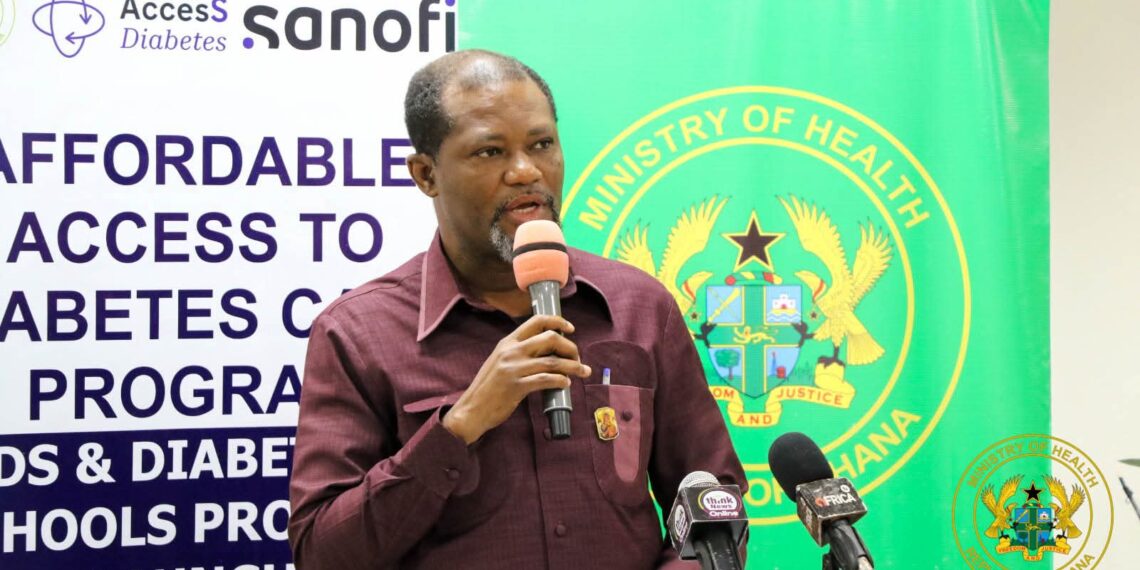The Ministry of Health has partnered with pharmaceutical company Sanofi to launch the Kids and Diabetes in Schools (KiDS) Programme, a major public health initiative designed to combat rising diabetes cases through early education and awareness among school children.
The programme, under the Affordable Access to Diabetes Care (AADC) framework, seeks not only to reach thousands of children, teachers, and parents in junior high schools across the country with early education on diabetes but to encourage healthy living, and support children already diagnosed with the condition.
Delivering a keynote speech on behalf of the Minister for Health, Dr. Ignatius Awinibuno, Director in charge of Allied Health, stressed the rising threat of diabetes among schoolchildren.
“There is an urgent need to address the increasing cases of both type 1 and type 2 diabetes among children in schools.
“We want to support children with type 1 diabetes to manage their condition confidently, reduce stigma and discrimination in schools, and prevent type 2 diabetes through healthy diets and lifestyle education”
Dr. Ignatius Awinibuno, Director of Allied Health

Dr. Awinibuno confirmed that the rollout would begin with 13 public schools and be supported with localized educational materials tailored for the Ghanaian context. These materials have been reviewed by appropriate health and government agencies.
“The content will be integrated into school curricula through structured teacher training workshops starting in the Greater Accra Region”
Dr. Ignatius Awinibuno, Director of Allied Health
He further added that the Ministry of Health has officially handed over the programme to the Ghana Education Service and the Ministry of Education for broader nationwide implementation.
The Ministry also confirmed that teacher training workshops would facilitate this integration, ensuring that schools become active platforms for diabetes awareness and management.
This forms part of Ghana’s broader effort to reduce the disease’s impact, particularly in underserved areas, by enhancing public awareness and access to care. The long-term objective is to embed diabetes education in schools nationwide, with sustained campaigns.

Sanofi’s And GES’ Commitment
Dr. Ardilles Adopo, Medical Director at Sanofi, used the platform to emphasize Sanofi’s ongoing commitment to support diabetes care in Ghana.
“Since 2023, Sanofi has actively supported the dissemination of national diabetes guidelines, donated equipment to four health centers, mentored 160 general practitioners, and enrolled over 240 healthcare workers in global training”
Dr. Ardilles Adopo, Medical Director at Sanofi
He noted that through the KiDS Programme, education would be delivered to over 7,700 children, parents, and teachers.
“We have trained 35 teachers to lead awareness efforts within schools. This initiative is about creating sustainable change at the community level”
Dr. Ardilles Adopo, Medical Director at Sanofi
Mrs. Theresa Oppong Mensah, National SHEP Coordinator at the Ghana Education Service, described the programme as timely and transformative. She called for wider collaboration across sectors.

“The KiDS Programme fills a significant gap in our schools regarding support for children living with or at risk of diabetes.
“Teachers, parents, and stakeholders must work together. We must also empower children to be health ambassadors in their homes and communities”
Mrs. Theresa Oppong Mensah, National SHEP Coordinator
The official launch brought together a broad spectrum of stakeholders, including directors from the Ministry of Health, officials from the Ghana Education Service, and Sanofi representatives.
The event signalled growing recognition among health and education authorities of the need to integrate preventive health into school systems.
The Ministry of Health emphasized that early education remains key in the national fight against diabetes. With the launch of the KiDS Programme, the government has taken a step toward embedding health literacy into the foundational years of Ghana’s youth – aiming not just to treat diabetes, but to prevent it.



















